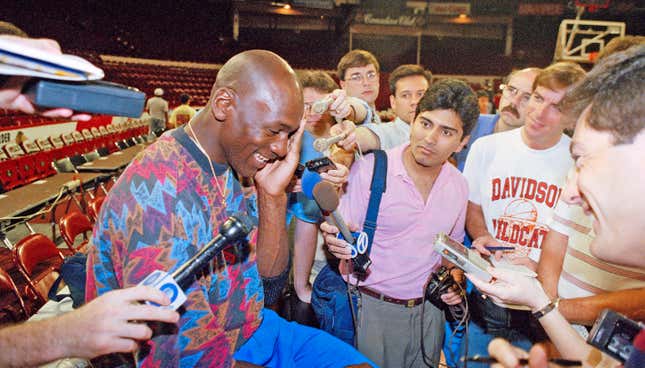Last night, some sports fans got an explanation they had been waiting years for.
It was only a matter of time before director Jason Hehir would reveal the more controversial side of Michael Jordan in his documentary The Last Dance. We learned about “The Jordan Rules,” we heard about his obsession with gambling, and we saw him clear the air about one of his most notorious quotes, “Republicans buy sneakers, too.”
Those four words were said in response to calls for Jordan to endorse then-U.S. Senate candidate Harvey Gantt (D), a black man running for North Carolina’s seat against blatant racist, Jesse Helms (R).
Jordan refused to pick a side and, instead, said “Republicans buy sneakers, too.”

Helms won by about 100,000 votes.
According to the documentary, the words were made in jest. But in the film, Jordan stuck by what he said decades ago.
Joking aside, the phrase was supposed to shield Jordan from political controversy and promote his signature Air Jordans. Instead, the phrase haunted him for years.
Jordan’s words marked something of a turning point in the star athletes’ role in politics.
Jesse Owens, Jackie Robinson, John Carlos, Tommie Smith, Wyomia Tyus, Billie Jean King, Bill Russell, Muhammad Ali and many others spent decades taking a stand and winning at the highest level.
These athletes broke down the walls of social activism in sports. But by the ’90s, Jordan had built a new foundation for the corporate, apolitical athlete.
Jordan made this athlete model acceptable, if not encouraged. He did not speak on issues outside the lines, and he made billions doing so.
None of this is necessarily wrong. Jordan is entitled to do what he wants.
And maybe now he is more influential behind closed doors, serving as the only black owner in the NBA and donating millions to socially continuous organizations and causes around the country.
In 2016, Jordan penned an article for The Undefeated. He wrote that he could “no longer be silent” in the wake of African-Americans dying at the hands of police, and was equally frustrated with Americans killing police. At the end of his article, he explains that he will donate $1 million dollars to both the International Association of Chiefs of Police’s newly established Institute for Community-Police Relations and the NAACP Legal Defense fund.
Still, “Republicans buy sneakers, too” remains etched into the memory of folks who pay attention to sports, politics, and the intersection between the two.
Hearing it again last night made me think about other famous sports phrases that have caused some sort of social or political backlash.
“I ain’t got no quarrel with them Viet Cong” — Muhammad Ali
Ali was the heavyweight champion of the world in 1967. He had recently changed his name from Cassius Clay, and was considered the best boxer on the planet. But that all changed when he said a few words that would alter the course of his life and American history.
“I ain’t got no quarrel with them Viet Cong,” he famously said, refusing to be drafted into the Vietnam War. In response, the U.S. government fined Ali $10,000 and sentenced him to five years in prison. Additionally, Ali was banned from boxing for three years.
“I’m not black, I’m O.J.” — O.J. Simpson
In 1967 sports sociologist, Harry Edwards, formed a group called, “the Olympic Project for Human Rights.” The group’s activist mission was to bring more black athletes into the civil rights movement and protest racism in sports ahead of the 1968 Olympics. When Edwards asked O.J., a potential U.S. track Olympian at the time, to be a part of the group, O.J. said “I’m not black, I’m O.J.”
The Oscar winning, O.J: Made In America, documentary makes the case that O.J. never really saw himself as a black man. He never joined the Olympic Project for Human Rights and he was noticeably absent from conversations around social and racial justice. O.J.’s race, however, did play a major role after his arrest for the murder of ex-wife Nicole Brown Simpson and Ronald Goldman in the trial of the century.
“Image is everything” — Andre Agassi
For a country club sport that encourages players to dress in white and show proper courtesy to opponents, image really is everything in Tennis. But Agassi’s “image is everything” commercial defined himself as a rebel in an overtly elitist sport. Agassi changed the way tennis looked, and introduced a new kind of fashion sense which can still be seen today.
“I am not a role model” — Charles Barkley
To this day, professional athletes are often characterized as role models. But Charles Barkley unapologetically said he was not one in a 1993 Nike commercial. Chuck’s phrase prompted immediate backlash from media, fans, and even other athletes. This ad was also in stark contrast to Michal Jordan’s PG “Be Like Mike” Gatorade commercial in 1991.
“Locker-room talk” — Donald Trump
Four years ago, Donald Trump took the Presidential debate stage and justified sexual predatory behavior and his infamous ‘grab ‘em by the pussy’ line as “locker-room talk.” The phrase also smeared professional athletes and provoked them to speak out against Trump’s grotesque use of “locker-room talk.”
“Equal pay!” chant — U.S. Women’s National Team supporters
Equal pay morphed from a soccer chant into a political rallying cry for gender pay equity in the United States. When the U.S. women’s national team won its fourth World Cup in 2019, supporters chanted, “equal pay.” Once the team returned to the U.S., it was greeted with a ticker-tape parade and more fans shouting the phrase.